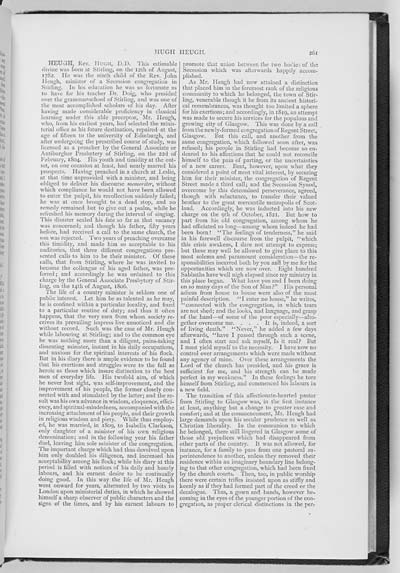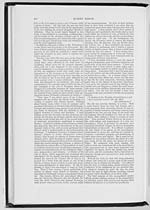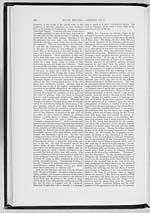261
HEUGH, Rev. HUGH, D.D. This estimable
divine was born at Stirling, on the 12th of August,
1782. He was the ninth child of the Rev. John
Heugh, minister of a Secession congregation in
Stirling. In his education he was so fortunate as
to have for his teacher Dr. Doig, who presided
over the grammar school of Stirling, and was one of
the most accomplished scholars of his day. After
having made considerable proficiency in classical
learning under this able preceptor, Mr. Heugh,
who, from his earliest years, had selected the minis-
terial office as his future destination, repaired at the
age of fifteen to the university of Edinburgh, and
after undergoing the prescribed course of study, was
licensed as a preacher by the General Associate or
Antiburgher Presbytery of Stirling, on the 22d of
February, 1804. His youth and timidity at the out-
set, on one occasion at least, had nearly marred his
prospects. Having preached in a church at Leslie,
at that time unprovided with a minister, and being
obliged to deliver his discourse memoriter, without
which compliance he would not have been allowed
to enter the pulpit, his recollection suddenly failed;
he was at once brought to a dead stop, and no
remedy remained but to give out a psalm, while he
refreshed his memory during the interval of singing.
This disaster sealed his fate so far as that vacancy
was concerned; and though his father, fifty years
before, had received a call to the same church, the
son was rejected. Two years of preaching overcame
this timidity, and made him so acceptable to his
auditories, that three different congregations pre-
sented calls to him to be their minister. Of these
calls, that from Stirling, where he was invited to
become the colleague of his aged father, was pre-
ferred; and accordingly he was ordained to this
charge by the General Associate Presbytery of Stir-
ling, on the 14th of August, 1806.
The life of a country minister is seldom one of
public interest. Let him be as talented as he may,
he is confined within a particular locality, and fixed
to a particular routine of duty; and thus it often
happens, that the very men from whom society re-
ceives its prevailing impress live unnoticed and die
without record. Such was the case of Mr. Heugh
while labouring at Stirling; and to the common eye
he was nothing more than a diligent, pains-taking
dissenting minister, instant in his daily occupations,
and anxious for the spiritual interests of his flock.
But in his diary there is ample evidence to be found
that his exertions and struggles were to the full as
heroic as those which insure distinction to the best
men of everyday life. His twofold aim, of which
he never lost sight, was self-improvement, and the
improvement of his people, the former closely con-
nected with and stimulated by the latter; and the re-
sult was his own advance in wisdom, eloquence, effici-
ency, and spiritual-mindedness, accompanied with the
increasing attachment of his people, and their growth
in religious wisdom and piety. While thus employ-
ed, he was married, in 1809, to Isabella Clarkson,
only daughter of a minister of his own religious
denomination; and in the following year his father
died, leaving him sole minister of the congregation.
The important charge which had thus devolved upon
him only doubled his diligence, and increased his
acceptability among his flock; while his diary at this
period is filled with notices of his daily and hourly
labours, and his earnest desire to be continually
doing good. In this way the life of Mr. Heugh
went onward for years, alternated by two visits to
London upon ministerial duties, in which he showed
himself a sharp observer of public characters and the
signs of the times, and by his earnest labours to
promote that union between the two bodies of the
Secession which was afterwards happily accom-
plished.
As Mr. Heugh had now attained a distinction
that placed him in the foremost rank of the religious
community to which he belonged, the town of Stir-
ling, venerable though it be from its ancient histori-
cal remembrances, was thought too limited a sphere
for his exertions; and accordingly, in 1819, an attempt
was made to secure his services for the populous and
growing city of Glasgow. This was done by a call
from the newly-formed congregation of Regent Street,
Glasgow. But this call, and another from the
same congregation, which followed soon after, was
refused; his people in Stirling had become so en-
deared to his affections that he could not reconcile
himself to the pain of parting, or the uncertainties
of a new career. Bent, however, upon what they
considered a point of most vital interest, by securing
him for their minister, the congregation of Regent
Street made a third call; and the Secession Synod,
overcome by this determined perseverance, agreed,
though with reluctance, to transfer their valued
brother to the great mercantile metropolis of Scot-
land. Accordingly, he was inducted into his new
charge on the 9th of October, 1821. But how to
part from his old congregation, among whom he
had officiated so long�among whom indeed he had
been born! "The feelings of tenderness," he said
in his farewell discourse from the pulpit, "which
this crisis awakens, I dare not attempt to express;
but these may well be allowed to give place to this
most solemn and paramount consideration�the re-
sponsibilities incurred both by you and by me for the
opportunities which are now over. Eight hundred
Sabbaths have well nigh elapsed since my ministry in
this place began. What have you and I been doing
on so many days of the Son of Man?" His personal
adieus from house to house were also of the most
painful description. "I enter no house," he writes,
"connected with the congregation, in which tears
are not shed; and the looks, and language, and grasp
of the hand�of some of the poor especially�alto-
gether overcome me. . . . It is, indeed, a sort
of living death." "Never," he added a few days
afterwards, "have I passed through such a scene,
and I often start and ask myself, Is it real? But
I must yield myself to the necessity. I have now no
control over arrangements which were made without
any agency of mine. Over these arrangements the
Lord of the church has presided, and his grace is
sufficient for me, and his strength can be made
perfect in my weakness." In these feelings he tore
himself from Stirling, and commenced his labours in
a new field.
The transition of this affectionate-hearted pastor
from Stirling to Glasgow was, in the first instance
at least, anything but a change to greater ease and
comfort; and at the commencement, Mr. Heugh had
large demands upon his secular prudence as well as
Christian liberality. In the communion to which
he belonged, there still lingered in Glasgow some of
those old prejudices which had disappeared from
other parts of the country. It was not allowed, for
instance, for a family to pass from one pastoral su-
perintendence to another, unless they removed their
residence within an imaginary boundary line belong-
ing to that other congregation, which had been fixed
by the church courts. Then, too, in public worship
there were certain trifles insisted upon as stiffly and
keenly as if they had formed part of the creed or the
decalogue. Thus, a gown and bands, however be-
coming in the eyes of the younger portion of the con-
gregation, as proper clerical distinctions in the per.

![]() Universal Viewer |
Universal Viewer | ![]() Mirador |
Large image | Transcription
Mirador |
Large image | Transcription
![]()

